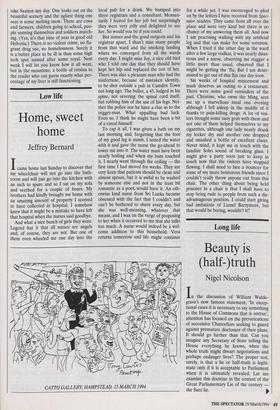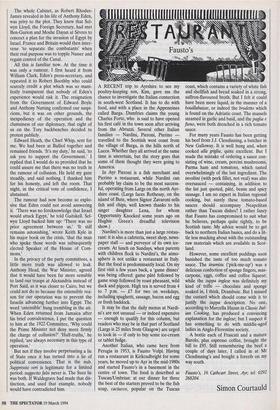Long life
Beauty is (half-)truth
Nigel Nicolson
In the discussion of William Walde- grave's now famous statement, 'In excep- tional cases it is necessary to say something to the House of Commons that is untrue', attention has focused on the prevarications of successive Chancellors seeking to guard against premature disclosure of their plans. It should go further than that. Can you imagine any Secretary of State telling the House everything he knows, when the whole truth might thwart negotiations and perhaps endanger lives? The proper test, surely, is that a lie or half-truth is legiti- mate only if it is acceptable to Parliament when it is ultimately revealed. Let me examine this doctrine in the context of the Great Parliamentary Lie of the century the Suez lie. The whole Cabinet, as Robert Rhodes- James revealed in his life of Anthony Eden, was privy to the plot. They knew that Sel- wyn Lloyd, the Foreign Secretary, had met Ben-Gurion and Moshe Dayan at Sevres to concoct a plan for the invasion of Egypt by Israel. France and Britain would then inter- vene 'to separate the combatants' when their real purpose was to topple Nasser and regain control of the Canal.
All this is familiar now. At the time it was only a rumour. I first heard it from William Clark, Eden's press-secretary, and repeated it to Robert Boothby who could scarcely credit a plot which was so mani- festly transparent that nobody of Eden's experience would risk it. The resignation from the Government of Edward Boyle and Anthony Nutting confirmed our suspi- cions, but it was on other grounds, the inexpediency of the operation and the clumsiness of our diplomacy, that eight of us on the Tory backbenches decided to protest publicly.
Edward Heath, the Chief Whip, sent for me. We had been at Balliol together and remained friends. 'It's my duty,' he said, 'to ask you to support the Government.' I replied that I would do so provided that he could assure me that there was no truth in the rumour of collusion. He held my gaze steadily, and said nothing. I thanked him for his honesty, and left the room. That night, in the critical vote of confidence, I abstained.
The rumour had now become so explo- sive that Eden could not avoid answering it. 'There was no foreknowledge that Israel would attack Egypt,' he told Gaitskell. Sel- wyn Lloyd backed him up: 'There was no prior agreement between us.' It still remains astonishing,' wrote Keith Kyle in his major book on the crisis, 'that the man who spoke those words was subsequently elected Speaker of the House of Com- mons.'
In the privacy of the party committees, a little more truth was allowed to leak. Anthony Head, the War Minister, agreed that it would have been far more sensible to land our troops at Alexandria instead of Port Said, as it was closer to Cairo, but we could not do so because the ostensible rea- son for our operation was to prevent the Israelis advancing further into Egypt. The word `ostensible' hung trembling in the air. When Eden returned from Jamaica after his brief convalescence, I put the question to him at the 1922 Committee, `Why could the Prime Minister not deny more firmly the charge of collusion?' Half-truths,' he replied, 'are always necessary in this type of operation.'
But not if they involve perpetuating a lie of State once it has turned into a lie of political convenience. That is the nub. Suppressio yeti is legitimate for a limited period: suggectio falsi never is. The Suez lie was both. If Waldegrave had made that dis- tinction, and used that example, nobody would have contradicted him.



























































 Previous page
Previous page